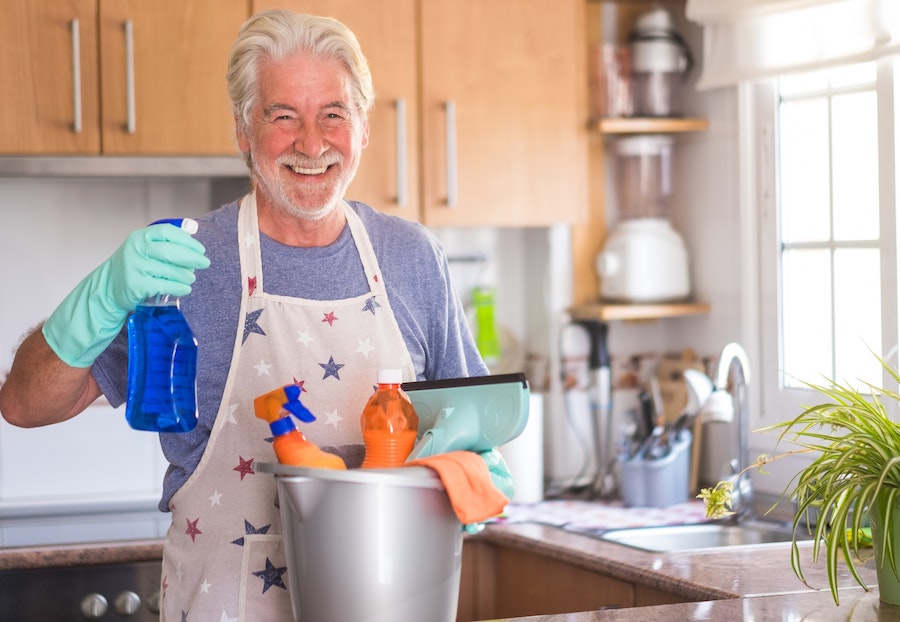Hospital cleaners share top tips for keeping your home virus-free
It’s always nice to have a clean home – and right now, home hygiene is especially important.
Although it’s unclear exactly how long the Covid-19 virus lingers on surfaces – and the risk of infection depends on lots of things, including the type of surfaces contaminated and the amount of virus shed – but keeping aware and on top of cleaning routines is generally a good idea.
The UK Government and Ireland’s Health Service Executive (HSE) recommend householders clean and disinfect frequently touched objects and surfaces, such as bathrooms, grab-rails in corridors and stairwells and door handles, and use regular household disinfectants to clean surfaces.
It’s advised to use a disposable cloth and first clean hard surfaces with warm soapy water – and who better to share some hands-on cleaning advice than cleaners who work in hospitals?
Do you know any #HiddenHeroes that deserve to be recognised for their hard work? Nominate them on Twitter or online here: https://t.co/RxWx05afzz 🏅 pic.twitter.com/Rd5RyrS7mZ
— NHS PropertyServices (@NHSProperty) June 4, 2020
Donna Williams and Diane Cullen work as part of the domestic team at NHS Property Services and over the past few months they’ve been on the frontline, undertaking deep cleans and helping minimise the spread of Covid-19 in hospitals. But as well as helping keep hospitals germ-free, the pair are keen to ensure householders know how to reduce contamination risk in their own homes too.
“Cleaning at home will probably seem like a chore for most, especially now we’re expected to do it even more often, and in day-to-day life it’s easy to let it slip down the priority list,” says Williams. “However, there are easy ways to keep on top of it and simple things you can do to stop the spread of germs, without having to do really deep cleans every time.”
Cullen adds: “As lockdown measures continue to lift, we’ll be coming into more and more contact with people outside of our households. While the house may seem like a safe environment, it’s still good to take precautions. We won’t be able to eradicate all germs or bacteria but it’s still important to be careful and keep up with basic cleanliness around the house, to stop any bacteria we may pick up spreading further.”
Here are their tips…
1. Don’t use cloths
“Our number one piece of advice – which people may find surprising – is not to use cloths when cleaning as they can cling on to germs and bacteria much better than other products,” says Williams. “We expect these will be one of the top items in people’s cleaning artillery, but it’s just as important to think about how and where you might be spreading germs, as well as cleaning them in the first place.”
2. Do use kitchen roll
Kitchen roll is a great alternative for cleaning surfaces to help stop the spread of germs, says Williams. However, remember that once an area’s been wiped, you’ll need to dispose of it – don’t use it to clean more than one area. “It’s also good to clean in one direction, so you’re wiping everything the same way,” she advises.
3. Don’t forget touchpoints

Give touchpoints, like handles, a regular wipe-down
Places people always forget to clean are regular household touchpoints, such as door handles and handrails on the staircase, says Cullen. “They may seem less important than food areas, for example, but they’re places everyone in the house will come in to contact with all the time without thinking. People returning home from a trip outside will be heading into different rooms, or up to the bathroom to wash, and touching various communal points along the way. This will become even more important as lockdown measures continue to ease in coming weeks, and friends and family may be allowed to visit each other’s houses.”
4. Keep surfaces clear
Try to keep surfaces clean and clear where you can, advises Williams. “This is especially important at the moment, as most of us will be bringing in things from the outside, such as shopping, food or parcels and placing them around the house, so keeping surfaces clean and clear will help ensure germs don’t linger.”
5. Disinfect when necessary
Williams says householders won’t always need to use disinfectant – unless someone in the house has, or could have, coronavirus. “If someone in your house does have Covid-19 or is suspected to, ensure you’re thoroughly disinfecting all areas and surfaces,” she stresses.
6. Wash your hands during house-cleaning
“Just as we need to wash hands after being outside or handling things, we recommend always washing your hands after carrying out different tasks in the home,” says Cullen. “This will again ensure germs don’t spread to different areas of the house. At work, we always make sure we have some moisturiser at hand, as washing all the time can dry them out.”
7. Take wipes when out and about
If you’re out and about, make sure you’ve got cleaning wipes to hand, as these can be used for anything you take with you so you can clean it before heading home. “Remember to clean any toys you might take out for the little ones too, as they’ll be bringing them back into the home – and, knowing my own grandchildren, might be putting them in their mouths,” adds Cullen.
8. Take care with takeaways
As an extra tip, Williams says that if she gets a takeaway meal, she takes an additional precaution. “When I take it out of the bag, I like to put down some kitchen roll first so it’s not touching the table and you have an extra barrier between the surface and the container.”
The Press Association
Latest posts by The Press Association (see all)
- Beatles documentary Let It Be to be released on Disney+ - April 16, 2024
- How to keep your money safe – as criminals ramp up AI tactics to steal consumer data - April 16, 2024
- Seasoned marathon runners give their best race day tips for first-timers - April 16, 2024
- What are heat pumps and could they help your home save energy? - April 15, 2024
- Trailer for Bridgerton season three teases new friends-to-lovers romance - April 12, 2024





















